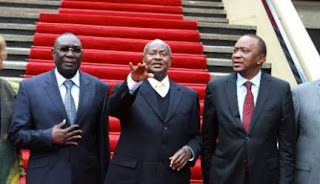While Nelson Mandela is fighting for his life in a Pretoria hospital,
members of his family are fighting each other, in a feud which is being
played out in lurid details in the local media.
Several family members have taken his eldest grandson, Mandla, to court
in a bid to exhume three of the former president's children, so they
can be reburied in the family graveyard in Qunu, where Mr Mandela wants
to be laid to rest.
And the battle over the exhumations is a sign of much deeper divisions
within Mr Mandela's large
and complex family – his three wives, 17
grandchildren and 12 surviving great-grandchildren.
According to some elders from his clan, while his family is at war, his spirit cannot be at peace.
Deep symbolism
Sixteen members of the Mandela family and local chiefs were last week
granted an interim order by the Mthatha High Court to exhume the remains
and return them to Qunu, where Mr Mandela's home is located.
But Mandla Mandela, who according to local media reports moved the
remains 22km (14 miles) from Qunu to his homestead in Mvezo in 2001, is
now contesting that ruling.
The remains are of Makgatho Mandela, Mandla's father who died from
Aids-related diseases in 2005 and his siblings, Thembekile, who was
killed in a car accident in 1969, and Makaziwe, his first daughter who
died when she was nine months old.
The three were apparently exhumed without consulting the rest of the
Mandela family and the elders of the AbaThembu royal house, into which
Mr Mandela was born.
While this may seem obscure and complicated to outsiders, it carries deep symbolism to South Africans.
Disturbing the dead is considered a bad omen in traditional culture.
A battle for power?
Some relatives and elders believe that Mr Mandela's recurrent illness
is a message from the ancestors, a sign that they are unhappy with
Mandla.
They believe Mr Mandela's spirit is troubled by the feuds in his family and that is why he is not "letting go".
There are 16 applicants in the exhumation case, reportedly including Mr
Mandela's wife Graca Machel, his daughter Makaziwe and senior members
of the AbaThembu clan.
Underlying this dispute, and others, is the question: "Who will replace Mr Mandela as head of the family?"
As his oldest male heir, the former South African president nominated
Mandla as chief Zwelivelile of the Thembu people, to succeed his father.
He is also an MP with the governing African National Congress (ANC).
But many within the family are becoming increasingly unhappy with him,
including Makaziwe, who is the oldest of Mandela's surviving children.
His plans to open a heritage centre in Mvezo, in the estate where the
graves are at the moment, have left a bitter taste in the mouths of many
within the family.
n a separate dispute over Mr Mandela's legacy, his daughters Makaziwe
and Zenani have gone to court in a bid to oust three of his aides from
Mr Mandela's companies.
The two want control over the companies said to be worth millions of dollars.
Unfinished business
Makaziwe last week convened an urgent "ibhunga" – traditional meeting –
in which Mandla was apparently chastised by family elders for moving
the remains of his relatives to begin with.
He has been at odds with his family since, the BBC understands.
Some believe the ailing family head needs to see this matter resolved before he can be at peace.
According to "isintu" – traditional South African culture – one of the
reasons a person fights death is because they have "unfinished
business".
Some believe that Mr Mandela's "unfinished business" is unifying his
divided family the same way he united black and white South Africans
after ending apartheid in 1994.
According to local culture, Mandla and his relatives will need to make peace before the bodies are exhumed.
The AbaThembu royal house has convened a meeting on 8 July in Qunu to try and resolve the matter, the Sapa news agency reports.
One of Mr Mandela's greatest personal pains was not seeing his children
grow up – because he dedicated his life to politics and spent 27 years
in prison for his opposition to white minority rule.
So while he could not be with them for most of his lifetime, his family
wants to make sure that they are at least together for eternity.
 RSS Feed
RSS Feed Twitter
Twitter










